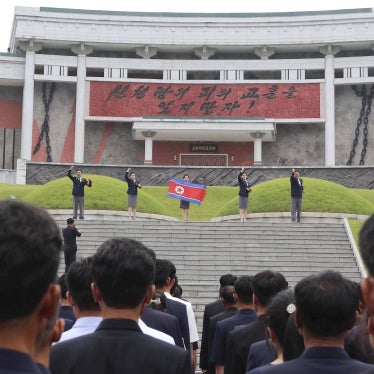(Hong Kong) - Human Rights Watch/Asia today sharply criticized the selection of a provisional legislature for Hong Kong. Meeting in Shenzhen, the 400-strong Selection Committee appointed by China chose sixty individuals to replace Hong Kong's elected Legislative Council or Legco.
"One fundamental right under international law is for people to freely choose their own government representatives," said Sidney Jones, executive director of Human Rights Watch/Asia. "The British government only belatedly and partially granted that right to the people of Hong Kong, but the Chinese government is determined to take it away. With every member of the provisional legislature handpicked and approved by Beijing, the chances that this body will protect the basic freedoms of expression and association guaranteed under the Basic Law are slim, if exercise of those freedoms incurs China's wrath." She noted that in its first year of operation, the legislature will have the power to enact security laws that could have far-reaching repercussions for human rights in Hong Kong; the ultimate check on the constitutionality of those laws will be the National People's Congress in Beijing.
Since the adoption of the Basic Law, the document that will serve as the constitution of the Special Administrative Region (SAR) of Hong Kong after July 1, 1997, the number of legislative councillors elected directly has increased from eighteen out of sixty in 1991 to twenty out of sixty in 1995. The appointment of all sixty seats in the provisional legislature by the Selection Committee, itself an appointed body, reverses the process of democratization in the territory. With over 70 percent of the 130 candidates also serving as Selection Committee members and therefore participating in the selection process, it is clear that the process of choosing the new legislators was neither free nor fair.
The provisional legislature will wield wide powers. According to a March 1996 decision by the China-appointed Preparatory Committee, it will be able to enact, amend, and repeal laws in accordance with the Basic Law for the "proper operation of the SAR." This could be a mandate to revive draconian British colonial security laws since repealed by the current Legco; legislate on subversion, sedition, treason and secession; and repeal key sections of the 1991 Bill of Rights.
The Bill of Rights entrenched within Hong Kong law important provisions of the International Covenant on Civil and Political Rights, which was extended to the territory by Britain in 1976. The Sino-British Joint Declaration of 1984 stated that the Covenant would remain in force after the transfer of sovereignty. The Chinese government now claims, however, that the Bill of Rights violates the 1984 agreement, which provided that the laws of Hong Kong should remain basically unchanged.
Today's selection arises from a 1994 decision by the National People's Congress (NPC) to dismantle the Legislative Council (Legco) along with the Urban and Regional Councils and the District Boards on June 30, 1997. Regarding the electoral reforms introduced in 1992 by Governor Chris Patten as a violation of the Joint Declaration, the Basic Law and a series of correspondences between China and the United Kingdom in 1991 (the "triple violations"), Chinese authorities decided to derail plans for the current Legislative Council to remain in place until 1998. It decided to install a provisional legislature in its place as a pretext to avoid a legal vacuum. However, the Basic Law makes no provision for such a provisional body. And while the 1994 NPC decision calls for the dissolution of the current Legco, it does not call for anything to precede the first Legislative Council which shall be established in accordance with Article 68 and Annex II of the Basic Law, which state that such a body shall be constituted by election.
In light of the repercussions that the establishment of a provisional legislature may have on the enjoyment of human rights in Hong Kong, Human Rights Watch urges that:
The Chinese government allow the current Legislative Council to complete its four-year term, under the provisions of Article 21 of the Universal Declaration of Human Rights, thereby upholding the rights of the Hong Kong people to vote and to take part in the conduct of public affairs through their freely chosen representatives.
In the event that China insists on dissolution of the current Legco, it should explore options other than the provisional legislature, including that the first legislative council in the SAR be established in accordance with the Basic Law -- that is, on the basis of free elections.
How Beijing keeps its commitments to uphold basic human rights in Hong Kong should significantly influence the economic and political relations with China and its major aid and trading partners including the U.S., Japan, the European Union member states, Canada and Australia.








